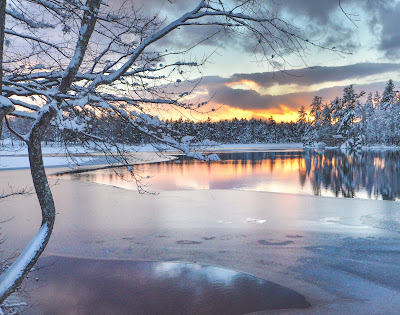 |
| Sunset on Jenness Pond CC Jean Stimmell: 11/28/14 |
Wandering through life for the last 76 years, I've wintered in various places: from cruising the rivers of Vietnam to laying water lines in the frozen sand of Cape Cod to vacationing off-grid in New Mexico at 7200 feet. But this Winter has been unique, spending six weeks at the Hope Lodge in Boston, an excellent refuge run by the American Cancer Society, accommodating folks like me undergoing chemo and radiation treatment. Here at Lodge, we are quite a club: forged by our common affliction, we combat the noxious side effects of cancer treatment with humor and compassion.
Due to the combination of Covid, plus our lowered immune system, we stay locked down with no visitors allowed, which is fine with me. Hibernating in winter has long been my choice, like the bear in Finnish mythology, who hunkers down in winter hoping to be reborn in the spring.1
That coincides with what Katherine May says in her well-received book, “Wintering:” If I befriend this cyclical rhythm, I can “emerge from the coldest season of the soul not only undiminished but revitalized.2 Rainer Maria Rilke wrote similarly about winter as the season for tending to the inner garden of the soul: “Suddenly to be healed again and aware that the very ground of my being — my mind and spirit — was given time and space in which to go on growing,”3
While it's fine and dandy for Rilke to putz around in his literary garden, my flash and blood garden feels like it has been plowed under by a John Deere tractor. Of course, it's all for a good cause: the proton radiation machine combined with toxic chemicals is designed to break up and kill the malignant clots in my soil, the first step in promoting healthy new growth.
No one said it would be easy. According to May: ‘wintering’s not just a cold season, but “a fallow period in life when you're cut off from the world, feeling rejected, sidelined, blocked from progress, or cast into the role of an outsider."
For May, her winter of discontent began after a series of family crises piled on top of a long history of depression. The only way she was able to pull through – while, at the same time finishing her book – was by recognizing winter for what it was: “Winter is the time of withdrawing from the world, maximizing scant resources… and vanishing from sight; but that’s where the transformation occurs. Winter is not the death of the life cycle, but its crucible.”4
She had some tricks up her sleeve: “When I started feeling the drag of winter, I began to treat myself like a favoured child: with kindness and love…I kept myself well fed and made sure I was getting enough sleep. I took myself for walks in the fresh air and spent time doing things that soothed me.”5 I’m doing the same. Plus, having Russet here to tend to me has been a godsend.
But it is no cakewalk. In Day’s words, "wintering is usually involuntary, lonely, and deeply painful." It's about riding on the roller coaster of nature's whims. Sometimes I live up to my aspirations, mindful as a yoga meditating by a still pond under a clear sky. But other times, I lose it altogether; my brave words swept away in a tsunami of pain, diarrhea, and numbing fatigue.
I keep in mind what wise woman, Pema Chodon, has written: "when things fall apart," we have a real opportunity for transformative change, but without reflection, it may be squandered." May tells us: "This is a crossroads… a moment when you need to shed a skin. If you do, you'll expose all those painful nerve endings and feel so raw that you'll need to take care of yourself for a while. If you don't, then that skin will harden around you."6
Once, after taking pain-killing drugs, I had a nightmare about accruing bad karma, payback for those psychological experiments I conducted at Columbia, studying stimulus and response by shocking white rats. But mostly, I daydream about escaping from these invasive medical interventions, along with the hubbub of the big city, to return home to blossom anew amidst the lady slippers and trilliums.
xxx
1 https://www.fairychamber.com/blog/bears-in-finnish-mythology-video
2 https://www.themarginalian.org/2021/03/06/wintering-katherine-may/
3 https://www.amazon.com/Letters-Young-Woman-Northwestern-Classics/dp/0810127407
4 May, Katherine. Wintering . Penguin Publishing Group. Kindle Edition. P.13
5 Ibid. Page 237
6 Ibid, page 14

















3 comments:
Hi Jean,
I read your columns in the Monitor, and am a fan I would say. I am glad that you are getting treatment in Boston, the best place to be, though maybe a shaman in Peru would offer a kinder, gentler path. But I have found that western medicine can be, and in my case, has been a life saver.
I am glad that Russett can be with you. That makes a huge difference.
I am sending hopes for good treatment, kind caregivers, and healing in many forms. Lucy Crichton, Concord
Another lovely piece. Where in New Mexico did you vacation? P. Davis wickingthemoisture.com
Hi Jean,
I love your writings in the Monitor! I hope you’re feeling better and hurry back to us in NH. If I can find you a local foods treat, let me know. I know many Vendors in the Farmers’ Market world!
Joan O’Connor-Henniker
Post a Comment